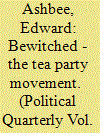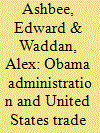| Srl | Item |
| 1 |
ID:
105863


|
|
|
|
|
| Publication |
2011.
|
| Summary/Abstract |
This article considers the development of the Tea Party movement, the character of its thinking and the nature of the interests and constituencies to which it is tied. The article suggests that despite the importance of ideas and interests, and the process of interaction between them, the movement has also been shaped and energised by institutional arrangements. In particular, it argues that there are significant numbers of independent or 'detached' conservatives and that the institutional architecture draws them towards political engagement but at the same time imposes constraints. The political friction that this creates has contributed to the anger that has characterised the movement. While the Tea Party movement may, as such, have only an ephemeral existence, independent conservatives are likely to remain a significant and potent constituency and will, within the institutional structures that define the American political process, give rise to other movements and protests.
|
|
|
|
|
|
|
|
|
|
|
|
|
|
|
|
| 2 |
ID:
096263


|
|
|
|
|
| Publication |
2010.
|
| Summary/Abstract |
For all the focus on economic issues in the wake of the crisis of 2008 the Obama administration has remained ambiguous about a central component of economic policy. As both candidate and President, Obama has sent mixed messages about trade policy. This ambiguity reflects wider uncertainty within the Democratic Party about global trading relationships and this paper explores and assesses the reasons for this uncertainty. A large part of the answer lies in the disparate sources of support for the Democrats. That is, the party has courted support from interest groups and core groups of voters that have widely divergent views about the value of trade liberalisation.
|
|
|
|
|
|
|
|
|
|
|
|
|
|
|
|
| 3 |
ID:
117495


|
|
|
|
|
| Publication |
2012.
|
| Summary/Abstract |
Barack Obama's election as US president gave rise to hopes of radical reform. Indeed, comparisons were drawn with 1932 and there were references to 'realignment'. Many on the left were quickly disappointed by the limited character of the American Recovery and Reinvestment Act, the abandonment of proposed reforms, and the concessions that were made to ensure the passage of healthcare legislation. Some explained these failures through agency-based accounts and pointed to what they saw as personal weakness. Others stressed the structural constraints imposed by the asymmetric character of partisan polarisation, the political weight of capital, and the institutional character of the American state. The article argues that the character of the 'Obama coalition' should also be considered. It has been relatively narrow particularly when compared with the 'Roosevelt coalition'. In particular, it failed to draw business fractions into its ranks.
|
|
|
|
|
|
|
|
|
|
|
|
|
|
|
|